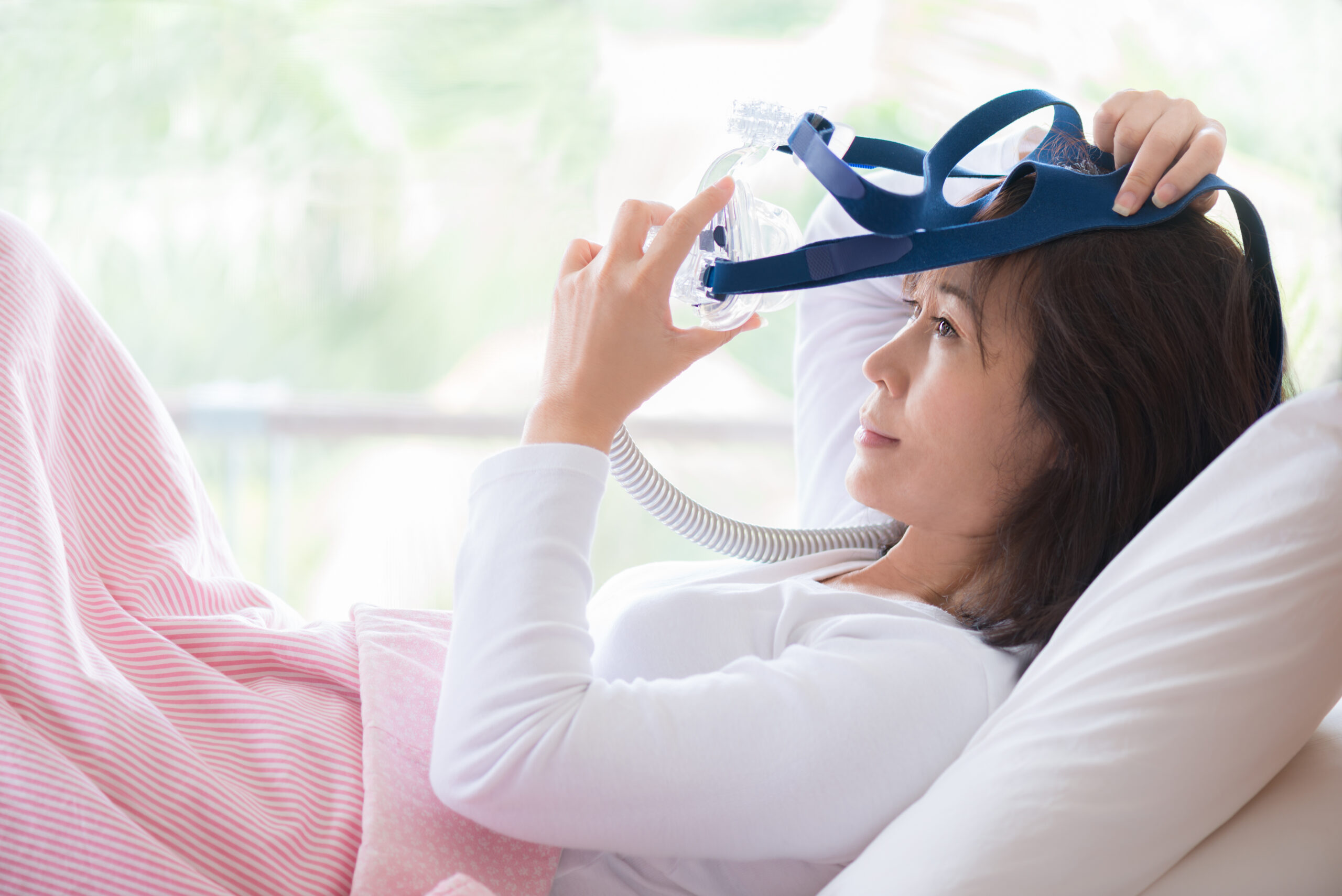The Best CPAP Therapy Starts with Targeted Treatment and Education
The best CPAP therapy delivers highly effective treatment for those suffering from Obstructive Sleep Apnea (OSA). Continuous Positive Airway Pressure therapy, or CPAP, keeps your airways open, providing a good night’s sleep and improving daytime performance.
It’s estimated that 33 million U.S. adults use a CPAP machine, according to the National Council on Aging. “Approximately 39 million U.S. adults have obstructive sleep apnea,” the council reports. “Untreated sleep apnea can lead to heart, kidney, and metabolic health complications.”
So how do you make an objective and informed decision on CPAP treatment?
Effective CPAP Machines Deliver the Best CPAP Therapy
How do you receive the best CPAP therapy? For starters, educate yourself on the ins-and-outs of CPAP treatment and CPAP machines.
A CPAP machine creates positive air pressure that keeps your airways open during sleep. It has a mask, or nasal pillow, that covers your nose or mouth, which is connected to a tube. The tube hooks into the machine that generates air pressure, which is just enough pressure that allows for normal breathing. A compressor pushes air through the tube and into the mask. This provides continuous air to ensure breathing properly throughout the night.
It can take time adjusting to using a CPAP machine every night. However, there are many reputable manufacturers. When choosing one, consider your individual needs and preferences and different features that may be right for you.
Some machines have a built-in humidifier, which can add moisture, making it more comfortable to breathe. Others have a ramp-up feature that gradually increases air pressure at the beginning of the night to help falling asleep. CPAP machines include:
- A standard CPAP machine. This is the most common type, delivering constant air pressure.
- A bi-level CPAP machine. This provides different pressures during inhalation and exhalation.
- An auto CPAP machine. This self-regulates pressure based on your needs.
- An adaptive servo ventilation CPAP machine. This is reserved for central sleep apnea cases, which is less common than obstructive sleep apnea.
Whatever CPAP therapy you receive, make sure your machine is a quality brand that can be well-maintained easily. The best machines are quiet, lightweight, easy to use, featuring automatic pressure adjustment and sleep-air intake measurements.
Some CPAP machines may be more effective than others, depending on your needs and preferences. Any CPAP machine’s noise level can affect your quality of sleep. Some are quieter than others.
What Does a CPAP Diagnosis and Therapy Include?
To find the best CPAP therapy, you need to know what it is, as well as the consultation process. So what is it?
A doctor will discuss your symptoms, sleep habits, and medical history. He may even recommend a sleep study to confirm whether you suffer from sleep apnea. Based on your diagnosis, treatment options might include CPAP therapy, lifestyle changes, or even surgery.
If CPAP is recommended, your specialist will help you choose a machine that fits your needs and preferences. You’ll learn how the machine works and how to strap on a proper mask-fitting for optimal comfort. You’ll likely have follow-up appointments to monitor your progress, experiment with settings over time, and address any other issues.
A team will check your sleep quality, any side effects from treatment, and answer any questions you may have. They’ll monitor weekly for difficulties and see where improvements can be made. Your number of visits will depend on your sleep apnea diagnosis and treatment progress. You may have more frequent appointments in the beginning to get acclimated. Visits should steadily decline as your treatment progresses.
Putting aside CPAP recommendations, the team may recommend an oral appliance instead of a machine. This instrument holds your airway open during sleep. Whether you use a CPAP machine or an oral appliance, additional lifestyle factors will also be discussed. Be prepared to discuss weight loss, quitting smoking, or avoiding alcohol before bed.
Come prepared to discuss questions or concerns you have about sleep apnea or your treatment options. Also, be open to different approaches. There’s no one-size-fits-all solution.
Finding the right therapy involves trial and error. A good CPAP specialist will create a personalized plan to put your sleep on the right track, and your health.
How the Best CPAP Therapy Improves Your Health
Some of the best CPAP therapy treatments can improve your sleep quality and reduce daytime fatigue. They also help you steer clear of cardiovascular risks and improve cognitive function. It all has to do with your airway passage, blood oxygen levels, and blood pressure. But how?
CPAP therapy helps you experience deeper, uninterrupted sleep. This allows your body to cycle through the various sleep stages necessary for proper rest and relaxation. As your middle-of-the-night arousals are decreased, continuous and restful sleep increases. Obstructive sleep apnea wakes you up to reestablish your breathing patterns, disrupting your sleep.
Even better: Deeper and consistent sleep translates into better daytime energy. Your body gets the rest it needs to function during the day. You’ll feel alert and experience less daytime sleepiness. This coincides with better and more consistent oxygen levels throughout the night, which helps combat fatigue and improve alertness. Sleep deprivation can lead to mood swings and difficulty concentrating. With CPAP therapy, patients’ moods are improved, since they can focus better throughout each day.
There’s also the benefit of reduced cardiovascular risks, such as heart disease or a stroke. CPAP treatment equates to lower blood pressure, since you’re not struggling to breath during your sleep apnea episodes. Those can put a strain on your heart and circulatory system, leading to higher blood pressure. Since chronic inflammation also declines with treatment, the risk of heart disease is lowered. Your circulatory system will get the lower-pressurized rest it needs, as OSA damages the lining of your blood vessels.
Lastly, you’ll benefit from better mental health. Oxygen deprivation from sleep apnea can impair your cognitive function. CPAP therapy ensures consistent oxygen flow to your brain, providing a boost in memory, learning, sharper thinking, and overall performance.
Brain Rhythms, Memory Consolidation, and Sleep
Why search for the best CPAP therapy? A recent study found a direct correlation between specific brain rhythms during sleep and memory consolidation.
It “provides evidence that our breathing patterns play a crucial role in how memories are reinforced,” according to Neuroscience News. “Researchers unveiled a critical link between breathing and memory consolidation during sleep. They discovered that specific sleep-related brain rhythms are directly influenced by our breathing patterns.”
It states that potential new treatments for sleep and memory disorders, particularly in older adults, could be beneficial. “These findings highlight the importance of respiration in reinforcing learned information while we sleep,” the report says. “This work could have significant implications for addressing age-related memory issues and sleep disorders.”
If you’re leaning toward getting CPAP therapy, just remember:
- Your CPAP machine provider should offer ongoing support and guidance to help you adjust to any unforeseeable issues. This may include regular follow-up appointments, equipment maintenance and replacement, and troubleshooting assistance.
- It’s important to verify insurance coverage and understand any out-of-pocket costs. Many insurance plans cover CPAP therapy for sleep apnea, but coverage may vary depending on the plan and provider.
Untreated obstructive sleep apnea can lead to serious health problems. However, CPAP therapy can change your life. It’s important to work with a licensed health care or CPAP specialist to determine if treatment is appropriate.
Wellness and Pain Can Help
Find your best CPAP therapy by visiting Wellness and Pain. We offer conservative treatments, routine visits, and minimally invasive quick-recovery procedures. We can keep you free of problems by providing lifestyle education and home care advice to help you avoid and manage issues, quickly relieving your inhibiting lifestyle conditions when complications arise.
At Wellness and Pain, we personalize patient care plans based on each patient’s condition and unique circumstances to improve wellness, increase mobility, relieve pain, and enhance your mental space and overall health.
Request an appointment to learn more!











